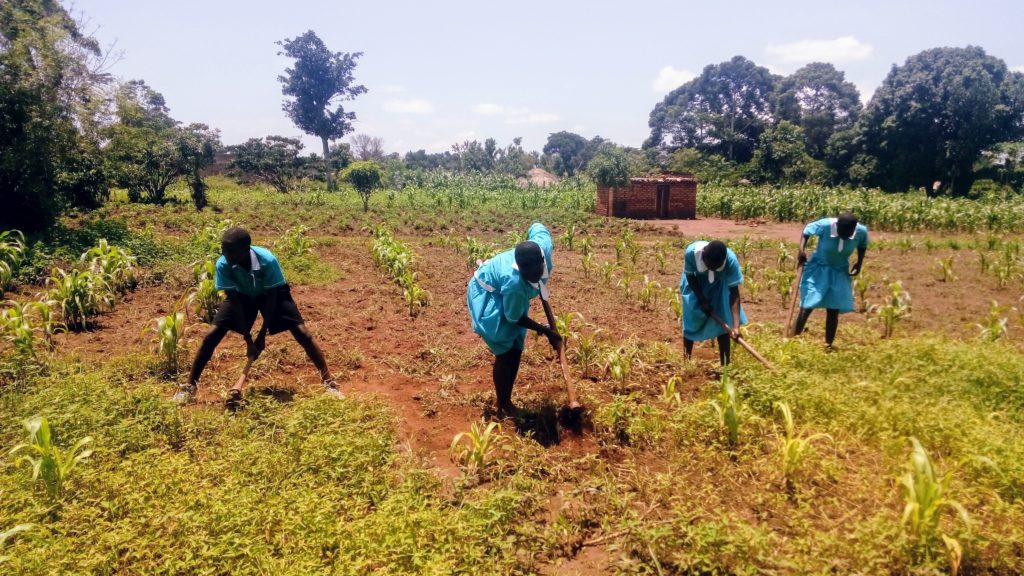
Uganda’s children are hungry for education. And we mean that quite literally.
While the nation abolished all tuition fees under its Universal Primary Education (UPE) Program back in 1996 to open up educational opportunities to the poor, poverty still finds its way into the educational system through the nation’s broader food insecurity challenges that affect 89% of the population.
One of the outcomes of such food insecurity is a paucity of food at school, leaving students’ bellies rumbling and minds wandering as they are often forced to sit through an entire day of classes on an empty stomach. Teachers as well are not immune to this lack of food, and they can sometimes be found leaving class early or even in the middle of the day to go and search for their own meals.
Uganda’s Ministry of Education and Sports has acknowledged the gravity of the situation, and has itself identified hunger as one of the main reasons children perform poorly in primary schools. From poor concentration and short-term memory retention, fatigue, malnutrition, absenteeism, and even drop-outs, the consequences of hunger cannot be ignored.
Some schools have addressed the lack of meals at school through Uganda’s Education Act of 2008, which permits schools to charge a limited amount of money for school meals, as agreed upon through each respective school management committee and district council. However, such payment is voluntary and even when money is able to be collected, it is usually only enough to provide nutritionally defunct maize porridge, and sometimes only for part of the year.
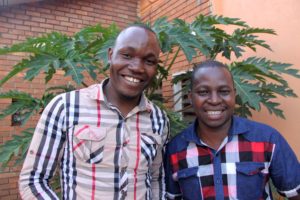
Cohort 2 Fellows Ibrahim Okello (left) and Michael Kamba (right)—founders of the Junior Farmer Fields initiative
To fill such gaps in students’ bellies and Uganda’s educational system, Building Tomorrow Fellows Ibrahim Okello and Michael Kamba have launched the Junior Farmer Fields initiative with the aim of improving children’s access to nutritious food both at school and at home.
The impetus for the initiative came when both Fellows realized that their schools often did not have enough food to provide children with meals year-round, and that even when meals were present, they were not providing children with the nutrients required to grow and thrive. What’s more, the Fellows observed that this same problem was happening at home, where meals were typically carbohydrate-based and lacking in essential vitamins for healthy development.
“There was a need to intervene and create knowledge, sensitization, and training in terms of growing crops and nutritious foods,” Ibrahim explains. “We wanted to introduce these meals—not just meals, but nutritious meals—so that these teachers and pupils can spend more time at school studying, instead of worrying about going to look for something to eat.”
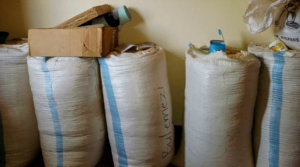
Maize storage for school meals at the BT Primary School of Bulemezi, one of the four schools at which Michael works.
The approach of the Junior Farmer Fields initiative is three-pronged. Firstly, Ibrahim and Michael work to strengthen the regularity of schools’ access to maize, the staple crop that schools rely upon to make porridge for the children. “In Uganda,” Michael describes, “we have two seasons—rainy season and dry season. In the dry season, there is basically very little food, even back at home. But when it rains and there is plenty of food, we encourage them to bring much more food [to school], and then we store that.” By advocating for students to bring food when it is plentiful in the rainy season and then safely storing it, the fellows are helping to create resilience for when food is much more scarce in the dry season. They complement these efforts by growing additional maize at school, where land area permits it.
Building upon this foundation, Ibrahim and Michael are also strengthening the capacity of schools to supplement such porridge with more nutritious vegetables that are grown at the school, and even at home. After forming clubs and training students in how to grow vegetables like cabbage, eggplant, green pepper, and tomatoes in nursery beds, the Fellows invite pupils to pick a few seedlings to take back home so that they can have these meals even when they are outside of school. The rest are used for the demonstration plots at the schools.
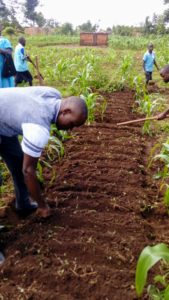
Ibrahim teaches the students at the BT Primary School of Isingo how to make a nursery bed for carrots, cabbage, and eggplant.
But the Junior Farmer Fields initiative is planting more than food—It is also sowing the idea that farming can be a profitable venture. This is the third and perhaps most critical aspect of the Junior Farmer Fields initiative. In a nation where almost three quarters of the population is employed in the agricultural sector, many of these students will grow up to be farmers. So teaching youth the skills they need to be successful agriculturalists will be key not just for their own well-being, but also for Uganda’s broader economic growth.
“We try to encourage students to take on agriculture, not just as a fallback position for when they drop out of school, but also to take it seriously as a business—as something that can actually take them beyond a peasant kind of life,” says Michael. This means teaching the children modern, sustainable farming methods. From proper spacing to pruning, organic pest control and fertilizers, and even micro-gardening in containers like bottles, tins, and sacks when land is not plentiful, Ibrahim and Michael are challenging children to think outside the box of what is possible when it comes to agriculture in their communities.
All eight of the schools at which they work now have functional demonstration plots, including the BT Primary School of Isingo and the BT Primary School of Bulemezi. But their impact does not stop there. Upon seeing the need for and success of the Junior Farmer Fields Initiative, Building Tomorrow adopted seeds as part of its package of goods and services offered to schools. All 40 of the schools with which Cohort 2 fellows work received seeds to jumpstart their own food and nutrition security initiatives, tailored to each of their requests and contexts. These seeds included maize, groundnuts, beans, cabbage, carrots, green pepper, tomatoes, and eggplant, among others.
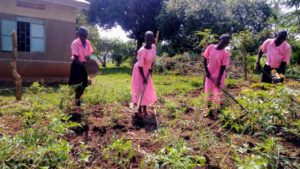
Students work together to weed their garden at the Namwendwa Primary School in Kamuli District. The government-constructed school is one of the four schools at which Fellow Ibrahim Okello works and has initiated the Junior Farmer Fields initiative.
For the Fellows, the decision by Building Tomorrow to take their initiative under its wings stands out as a very special moment. “When [the seeds] came through, for me, that was really really really wonderful because I could see the teachers were very happy,” Ibrahim recalls. “We had been pushing for things to move forward. We wanted the gardens.” The arrival of the seeds helped to finally give the Junior Farmer Fields initiative the impetus that it needed to flourish. Because of this, Michael adds, “We feel like our idea has impacted society, and beyond the Kamuli region.”
The seeds, according to the Fellows, will help the communities for more than just one season, as seed saving, proper pruning, and even the sale of the initial produce will help them to continue the initiative in the long-term. “The idea for us is to start with a school, give it the initial input, let it produce, and then use whatever is produced from the first seasons for the next seasons,” Michael explains.
Thanks to this model, Ibrahim and Michael are literally and figuratively planting the seeds of change to improve food security and nutrition in their communities.
The Building Tomorrow Fellows Program supports the piloting and scaling of innovations that can have a system-wide impact, including the Junior Farmer Fields initiative to combat hunger and nutrition in Uganda’s schools and beyond. For just $75, you can help to plant a school garden to address food and nutrition insecurity in rural communities, while teaching critical agricultural skills for a successful future.

Follow Us on Social Media